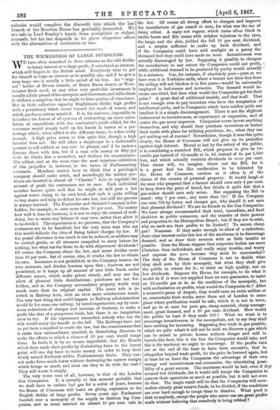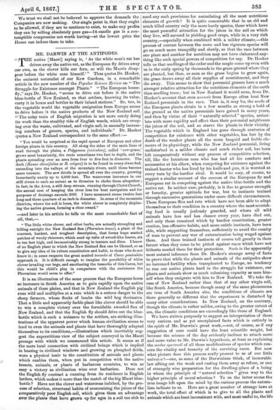THE WICKEDNESS OF LARGE DIVIDENDS.
• profit like that of a prosperous bank, but there is no temptation even to try. If the experiment succeeded, nobody who ran the • risk would enjoy the benefit to the full. The Railways have not as yet been compelled to evade the law, but the consciousness that it exists does extraordinary mischief, in disinclining directors to make the efforts to which a chance of 20 per cent. would tempt them. In India it is by no means improbable that the Boards which have made their profits by diminishing fares to the lowest point, will one day have to waste money in order to keep their wisely earned dividends within Parliamentary limits. They can- not make fares much lower without destroying the narrow margin which brings so much, and what are they to do with the cash ? They will waste it simply.
The very worst case of all, however, is that of the London Gas Companies. It is actually at this moment probable that we shall have to endure bad gas for a series of years, because the House of Commons will insist on giving expression to the English dislike of large profits. Seven years ago Parliament handed over a monopoly of the supply to thirteen big Com- panies, and as usual inserted its absurd 10 per cent. rule in the Act. Of course all strong effort to cheapen and improve the manufacture of gas ceased at once, for what was the use of doing either. A nasty red vapour, which turns silver black in twelve hours and fills rooms with sulphur injurious to the eyes, the lungs, and the skin, yielded the full 10 per cent. dividend, and a surplus sufficient to ,make up back dividend, and if the Companies could have sold sunlight at a penny the thousand feet they could have made no more. Inventiveness was actually discouraged by law. Supposing it possible to cheapen the manufacture to any extent the Companies could not profit,, while additional demand to be produced by purity would actually-' be a nuisance. Gas, for instance, if absolutely pure—pure as we have seen it in Yorkshire mills, where a burner not three feet from the ceiling will not blacken it in five years—would be universally employed in bed-rooms and nurseries. The demand would in- crease one-third, but then what would the Companies get for their pains ? A great deal of additional trouble, and that is all. That is not enough even to pay inventors who have the temptation of intellectual pride, and to Companies which have neither pride nor intellect it is a simple discouragement. There is not the slightest inducement to inventiveness, or experiment, or expansion, and of course the gas never improves. Companies never invent anything themselves, and why should they purchase inventions or bother their heads with plans for utilizing petroleum, &c., when they can get nothing out of success ? Nevertheless, though it sees this quite clearly, the House of Commons will not give up its prejudice against high interest. Moved at last by the outcry of the public, it is considering a wretched Bill, which proposes to give us 14- candle gas instead of 12-candle at 3s. 6d. instead of 4s. per 1,000 feet, and which actually restricts dividends to seven per cent. That clause will, we imagine, throw out the Bill, for it is a great deal too like confiscation to be tolerated by the House of Commons, careless as it often is of the claims of the owners of personal property. It would laugh at the man who proposed that a farmer should earn only 4 per cent. to keep down the price of bread, but thinks it quite fair that a gas-maker should earn only seven. But supposing the Bill to stand ; why 7 per cent., any more than 70? If the Company can earn 700 by better and cheaper gas, why should it not earn that pleasant dividend ? We are no friends to the Gas Companies. We have always recommended their total, immediate, and final abolition as public nuisances, and the transfer of their powers and properties to the Metropolitan Board ; but if they are to exist, why on earth are their profits to be limited? To secure cheap gas? Nonsense. If they make enough to allow of a reduction, their clear interest under this law of the maximum is to discourage demand, and so draw their revenue with as little trouble as possible. Does the House suppose that corporate bodies are more Christian than individuals, and really enjoy trouble, and worry and expense the more because they must be unrewarded? The duty of the House of Commons is not to decide what they shall earn by their monopoly, but what they shall give the public in return for it ; to insist on high quality, not on low dividends. Suppose the House, for example, to do what it would do if it were not supplied from its own gasometer, to insist on 22-candle gas at 4s. as the condition of the monopoly, but with no limitation on profits, what would the Companies do ? After a moment's pause of despair, they would raise an extra million or so, concentrate their works, move them out of London to some place where purification would be safe, which it is not in town, and go in at once for pure gas, cheap material, cheap manage- ment, great demand, and a 20 per cent. dividend. How would the public be hurt if they made 100? What we want is to encourage inventiveness in the monopolists, not to say they shall have nothing for inventing. Supposing free trade in gas possible, which we quite admit it will not be until we discover a gas which can be stored in private houses without danger and sold in barrels like beer, this is the line the Companies would take, and this is the tendency we ought to encourage. If the profits turn out at the end of the lease to have been excessive, that is, altogether beyond trade profit, let the price be lowered again, but at least let us leave the Companies the advantage of their own energy and inventiveness and economies, the stimulating possi- bility of a great success. The maximum would be bad, even if it secured low dividends, for it would still tempt the Companies to narrow their operations as much as possible, but it will not even do that. The single result will be that the Companies will accu- mulate silently great reserve funds, to be divided, if the conditions are ever hard enough to tempt them to dissolve. What good is that to anybody, except the people who never can see great profits made without believing that somebody is being robbed ?
We trust we shall not be believed to approve the demands the Companies are now making. Our single point is, that they ought to be allowed, if they are to continue to exist, to make any profits they can by selling absolutely pure gas-14-candle gas is a con- temptible compromise not worth having—at the lowest price the House can induce them to take.































 Previous page
Previous page